- Home
- Diana Wynne Jones
The Magicians of Caprona Page 3
The Magicians of Caprona Read online
Page 3
Whatever the reason, argument raged. Anxious Antonio talked of going to England and consulting someone called Chrestomanci about it. “We want a really strong spell-maker for her,” he said. To which Elizabeth replied that Rosa was Italian and should marry an Italian. The rest of the family agreed, except that they said the Italian must be from Caprona. So the question was who.
Paolo, Lucia and Tonino had no doubt. They wanted Rosa to marry their cousin Rinaldo. It seemed to them entirely fitting. Rosa was lovely, Rinaldo handsome, and none of the usual objections could possibly be made. There were two snags, however. The first was that Rinaldo showed no interest in Rosa. He was at present desperately in love with a real English girl—her name was Jane Smith, and Rinaldo had some difficulty pronouncing it—and she had come to copy some of the pictures in the Art Gallery down on the Corso. She was a romantic girl. To please her, Rinaldo had taken to wearing black, with a red scarf at his neck, like a bandit. He was said to be considering growing a bandit moustache too. All of which left him with no time for a cousin he had known all his life.
The other snag was Rosa herself. She had never cared for Rinaldo. And she seemed to be the only person in the Casa who was entirely unconcerned about who she would marry. When the argument raged loudest, she would shake the blond hair on her shoulders and smile. “To listen to you all,” she said, “anyone would think I have no say in the matter at all. It’s really funny.”
All that autumn, the worry in the Casa Montana grew. Paolo and Tonino asked Aunt Maria what it was all about. Aunt Maria at first said that they were too young to understand. Then, since she had moments when she was as passionate as Aunt Gina or even Aunt Francesca, she told them suddenly and fervently that Caprona was going to the dogs. “Everything’s going wrong for us,” she said. “Money’s short, tourists don’t come here, and we get weaker every year. Here are Florence, Pisa and Siena all gathering round like vultures, and each year one of them gets a few more square miles of Caprona. If this goes on we shan’t be a State any more. And on top of it all, the harvest failed this year. It’s all the fault of those degenerate Petrocchis, I tell you! Their spells don’t work any more. We Montanas can’t hold Caprona up on our own! And the Petrocchis don’t even try! They just keep turning things out in the same old way, and going from bad to worse. You can see they are, or that child wouldn’t have been able to turn her father green!”
This was disturbing enough. And it seemed to be plain fact. All the years Paolo and Tonino had been at school, they had grown used to hearing that there had been this concession to Florence; that Pisa had demanded that agreement over fishing rights; or that Siena had raised taxes on imports to Caprona. They had grown too used to it to notice. But now it all seemed ominous. And worse shortly followed. News came that the Old Bridge had been seriously cracked by the winter floods.
This news caused the Casa Montana real dismay. For that bridge should have held. If it gave, it meant that the Montana charms in the foundations had given too. Aunt Francesca ran shrieking into the yard. “Those degenerate Petrocchis! They can’t even sustain an old spell now! We’ve been betrayed!”
Though no one else put it quite that way, Aunt Francesca probably spoke for the whole family.
As if that was not enough, Rinaldo set off that evening to visit his English girl, and was led back to the Casa streaming with blood, supported by his cousins Carlo and Giovanni. Rinaldo, using curse words Paolo and Tonino had never heard before, was understood to say he had met some Petrocchis. He had called them degenerate. And it was Aunt Maria’s turn to rush shrieking through the yard, shouting dire things about the Petrocchis. Rinaldo was the apple of Aunt Maria’s eye.
Rinaldo had been bandaged and put to bed, when Antonio and Uncle Lorenzo came back from viewing the damage to the Old Bridge. Both looked very serious. Old Guido Petrocchi himself had been there, with the Duke’s contractor, Mr. Andretti. Some very deep charms had given. It was going to take the whole of both families, working in shifts, at least three weeks to mend them.
“We could have used Rinaldo’s help,” Antonio said.
Rinaldo swore that he was well enough to get out of bed and help the next day, but Aunt Maria would not hear of it. Nor would the doctor. So the rest of the family was divided into shifts, and work went on day and night. Paolo, Lucia and Corinna went to the bridge straight from school every day. Tonino did not. He was still too slow to be much use. But from what Paolo told him, he did not think he was missing much. Paolo simply could not keep up with the furious pace of the spells. He was put to running errands, like poor Cousin Domenico. Tonino felt very sympathetic towards Domenico. He was the opposite of his dashing brother Rinaldo in every way, and he could not keep up with the pace of things either.
Work had been going on, often in pouring rain, for nearly a week, when the Duke of Caprona summoned Old Niccolo to speak to him.
Old Niccolo stood in the yard and tore what was left of his hair. Tonino laid down his book (it was called Machines of Death and quite fascinating) and went to see if he could help.
“Ah, Tonino,” said Old Niccolo, looking at him with the face of a grieving baby, “I have gigantic problems. Everyone is needed on the Old Bridge, and that ass Rinaldo is lying in bed, and I have to go before the Duke with some of my family. The Petrocchis have been summoned too. We cannot appear less than they are, after all. Oh why did Rinaldo choose such a time to shout stupid insults?”
Tonino had no idea what to say, so he said, “Shall I get Benvenuto?”
“No, no,” said Old Niccolo, more upset than ever. “The Duchess cannot abide cats. Benvenuto is no use here. I shall have to take those who are no use on the bridge. You shall go, Tonino, and Paolo and Domenico, and I shall take your Uncle Umberto to look wise and weighty. Perhaps that way we shan’t look so very thin.”
This was perhaps not the most flattering of invitations, but Tonino and Paolo were delighted nevertheless. They were delighted even though it rained hard the next day, the drilling white rain of winter. The dawn shift came in from the Old Bridge under shiny umbrellas, damp and disgruntled. Instead of resting, they had to turn to and get the party ready for the Palace.
The Montana family coach was dragged from the coach-house to a spot under the gallery, where it was carefully dusted. It was a great black thing with glass windows and monster black wheels. The Montana winged horse was emblazoned in a green shield on its heavy doors. The rain continued to pour down. Paolo, who hated rain as much as the cats did, was glad the coach was real. The horses were not. They were four white cardboard cut-outs of horses, which were kept leaning against the wall of the coach-house. They were an economical idea of Old Niccolo’s father’s. As he said, real horses ate and needed exercise and took up space the family could live in. The coachman was another cardboard cut-out—for much the same reasons—but he was kept inside the coach.
The boys were longing to watch the cardboard figures being brought to life, but they were snatched indoors by their mother. Elizabeth’s hair was soaking from her shift on the bridge and she was yawning until her jaw creaked, but this did not prevent her doing a very thorough scrubbing, combing and dressing job on Paolo and Tonino. By the time they came down into the yard again, each with his hair scraped wet to his head and wearing uncomfortable broad white collars above their stiff Eton jackets, the spell was done. The spell-streamers had been carefully wound into the harness, and the coachman clothed in a paper coat covered with spells on the inside. Four glossy white horses were stamping as they were backed into their traces. The coachman was sitting on the box adjusting his leaf-green hat.
“Splendid!” said Old Niccolo, bustling out. He looked approvingly from the boys to the coach. “Get in, boys. Get in, Domenico. We have to pick up Umberto from the University.”
Tonino said good-bye to Benvenuto and climbed into the coach. It smelt of mold, in spite of the dusting. He was glad his grandfather was so cheerful. In fact everyone seemed to be. The family cheered as the coach rumbled to the
gateway, and Old Niccolo smiled and waved back. Perhaps, Tonino thought, something good was going to come from this visit to the Duke, and no one would be so worried after this.
The journey in the coach was splendid. Tonino had never felt so grand before. The coach rumbled and swayed. The hooves of the horses clattered over the cobbles just as if they were real, and people hurried respectfully out of their way. The coachman was as good as spells could make him. Though puddles dimpled along every street, the coach was hardly splashed when they drew up at the University, with loud shouts of “Whoa there!”
Uncle Umberto climbed in, wearing his red and gold Master’s gown, as cheerful as Old Niccolo. “Morning, Tonino,” he said to Paolo. “How’s your cat? Morning,” he said to Domenico. “I hear the Petrocchis beat you up.” Domenico, who would have died sooner than insult even a Petrocchi, went redder than Uncle Umberto’s gown and swallowed noisily. But Uncle Umberto never could remember which younger Montana was which. He was too learned. He looked at Tonino as if he was wondering who he was, and turned to Old Niccolo. “The Petrocchis are sure to help,” he said. “I had word from Chrestomanci.”
“So did I,” said Old Niccolo, but he sounded dubious.
The coach rumbled down the rainswept Corso and turned out across the New Bridge, where it rumbled even more loudly. Paolo and Tonino stared out of the rainy windows, too excited to speak. Beyond the swollen river, they clopped uphill, where cypresses bent and lashed in front of rich villas, and then among blurred old walls. Finally they rumbled under a great archway and made a crisp turn around the gigantic forecourt of the Palace. In front of their own coach, another coach, looking like a toy under the huge marble front of the Palace, was just drawing up by the enormous marble porch. This carriage was black too, with crimson shields on its doors, in which ramped black leopards. They were too late to see the people getting out of it, but they gazed with irritated envy at the coach itself and the horses. The horses were black, beautiful slender creatures with arched necks.
“I think they’re real horses,” Paolo whispered to Tonino.
Tonino had no time to answer, because two footmen and a soldier sprang to open the carriage door and usher them down, and Paolo jumped down first. But after him, Old Niccolo and Uncle Umberto were rather slow getting down. Tonino had time to look out of the further window at the Petrocchi carriage moving away. As it turned, he distinctly saw the small crimson flutter of a spell-streamer under the harness of the nearest black horse. So there! Tonino thought triumphantly. But he rather thought the Petrocchi coachman was real. He was a pale young man with reddish hair which did not match his cherry-colored livery, and he had an intent, concentrating look, as if it was not easy driving those unreal horses. That look was too human for a cardboard man.
When Tonino finally climbed down on Domenico’s nervous heels, he glanced up at their own coachman for comparison. He was efficient and jaunty. He touched a stiff hand to his green hat and stared straight ahead. No, the Petrocchi coachman was real all right, Tonino thought enviously.
Tonino forgot both coachmen as he and Paolo followed the others into the Palace. It was so grand, and so huge. They were taken through vast halls with shiny floors and gilded ceilings, which seemed to go on for miles. On either side of the long walls there were statues, or soldiers, or footmen, adding to the magnificence in rows. They felt so battered by all the grandeur that it was quite a relief when they were shown into a room only about the size of the Casa Montana yard. True, the floor was shiny and the ceiling painted to look like a sky full of wrestling angels, but the walls were hung with quite comfortable red cloth and there was a row of almost plain gilt chairs along each side.
Another party of people was shown into the room at the same time. Domenico took one look at them and turned his eyes instantly on the painted angels of the ceiling. Old Niccolo and Uncle Umberto behaved as if the people were not there at all. Paolo and Tonino tried to do the same, but they found it impossible.
So these were the Petrocchis, they thought, sneaking glances. There were only four of them, to their five. One up to the Montanas. And two of those were children. Clearly the Petrocchis had been as hard-pressed as the Montanas to come before the Duke with a decent party, and they had, in Paolo and Tonino’s opinion, made a bad mistake in leaving one of their family outside with the coach. They were not impressive. Their University representative was a frail old man, far older than Uncle Umberto, who seemed almost lost in his red and gold gown. The most impressive one was the leader of the party, who must be Old Guido himself. But he was not particularly old, like Old Niccolo, and though he wore the same sort of black frock-coat as Old Niccolo and carried the same sort of shiny hat, it looked odd on Old Guido because he had a bright red beard. His hair was rather long, crinkly and black. And though he stared ahead in a bleak, important way, it was hard to forget that his daughter had once accidentally turned him green. Paolo and Tonino both sneaked fascinated glances, wondering what that red beard would look like as bright green.
The two children were both girls. Both had reddish hair. Both had prim, pointed faces. Both wore bright white stockings and severe black dresses and were clearly odious. The main difference between them was that the younger—who seemed about Tonino’s age—had a large bulging forehead, which made her face even primmer than her sister’s. It was possible that one of them was the famous Angelica, who had turned Old Guido green. The boys stared at them, trying to decide which it might be, until they encountered the prim, derisive stare of the elder girl. It was clear she thought they looked ridiculous. But Paolo and Tonino knew they still looked smart—they felt so uncomfortable—so they took no notice.
After they had waited a while, both parties began to talk quietly among themselves, as if the others were not there. Tonino murmured to Paolo, “Which one is Angelica?” “I don’t know,” Paolo whispered. “Didn’t you see them at the Old Bridge then?” “I didn’t see any of them. They were all down the other—” Part of the red hanging swung aside and a lady hurried in. “I’m so sorry,” she said. “My husband has been delayed.”
Everyone in the room bent their heads and murmured “Your Grace” because this was the Duchess. But Paolo and Tonino kept their eyes on her while they bent their heads, wanting to know what she was like. She had a stiff grayish dress on, which put them in mind of a statue of a saint, and her face might almost have been part of the same statue. It was a statue-pale face, almost waxy, as if the Duchess were carved out of slightly soapy marble. But Tonino was not sure the Duchess was really like a saint. Her eyebrows were set in a strong sarcastic arch, and her mouth was tight with what looked like impatience. For a second, Tonino thought he felt that impatience—and a number of other unsaintly feelings—pouring into the room from behind the Duchess’s waxy mask like a strong rank smell.
The Duchess smiled at Old Niccolo. “Signor Niccolo Montana?” There was no scrap of impatience, only stateliness. Tonino thought to himself, I’ve been reading too many books. Rather ashamed, he watched Old Niccolo bow and introduce them all. The Duchess nodded graciously and turned to the Petrocchis. “Signor Guido Petrocchi?”
The red-bearded man bowed in a rough, brusque way. He was nothing like as courtly as Old Niccolo. “Your Grace. With me are my great-uncle Dr. Luigi Petrocchi, my elder daughter, Renata, and my younger daughter, Angelica.”
Paolo and Tonino stared at the younger girl, from her bulge of forehead to her thin white legs. So this was Angelica. She did not look capable of doing anything wrong, or interesting.
The Duchess said, “I believe you understand why—”
The red curtains were once more swept aside. A bulky excited-looking man raced in with his head down, and took the Duchess by one arm. “Lucrezia, you must come! The scenery looks a treat!”
The Duchess turned as a statue might turn, all one piece. Her eyebrows were very high and her mouth pinched. “My lord Duke!” she said freezingly.
Tonino stared at the bulky man. He was now wearing slightly s
habby green velvet with big brass buttons. Otherwise, he was exactly the same as the big damp Mr. Glister who had interrupted the Punch and Judy show that time. So he had been the Duke of Caprona after all! And he was not in the least put off by the Duchess’s frigid look. “You must come and look!” he said, tugging at her arm, as excited as ever. He turned to the Montanas and the Petrocchis as if he expected them to help him pull the Duchess out of the room—and then seemed to realize that they were not courtiers. “Who are you?”
“These,” said the Duchess—her eyebrows were still higher and her voice was strong with patience—“these are the Petrocchis and the Montanas awaiting your pleasure, my lord.”
The Duke slapped a large, damp-looking hand to his shiny forehead. “Well I’m blessed! The people who make spells! I was thinking of sending for you. Have you come about this enchanter-fellow who’s got his knife into Caprona?” he asked Old Niccolo.
“My lord!” said the Duchess, her face rigid.
But the Duke broke away from her, beaming and gleaming, and dived on the Petrocchis. He shook Old Guido’s hand hugely, and then the girl Renata’s. After that, he dived around and did the same to Old Niccolo and Paolo. Paolo had to rub his hand secretly on his trousers after he let go. He was wet. “And they say the young ones are as clever as the old ones,” the Duke said happily. “Amazing families! Just the people I need for my play—my pantomime, you know. We’re putting it on here for Christmas and I could do with some special effects.”
The Duchess gave a sigh. Paolo looked at her rigid face and thought that it must be hard, dealing with someone like the Duke.
The Duke dived on Domenico. “Can you arrange for a flight of cupids blowing trumpets?” he asked him eagerly. Domenico swallowed and managed to whisper the word “illusion.” “Oh good!” said the Duke, and dived at Angelica Petrocchi. “And you’ll love my collection of Punch and Judys,” he said. “I’ve got hundreds!”

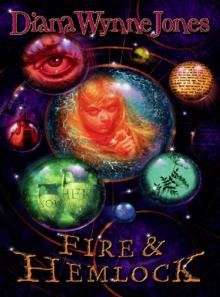 Fire and Hemlock
Fire and Hemlock Reflections: On the Magic of Writing
Reflections: On the Magic of Writing The Game
The Game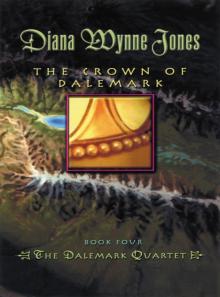 The Crown of Dalemark
The Crown of Dalemark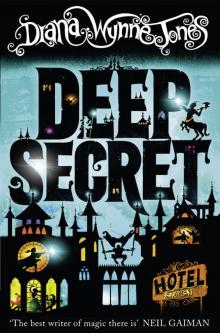 Deep Secret
Deep Secret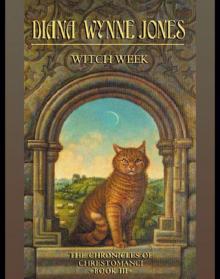 Witch Week
Witch Week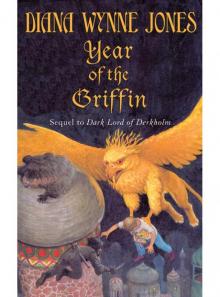 Year of the Griffin
Year of the Griffin Wild Robert
Wild Robert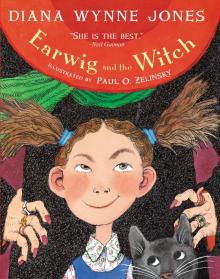 Earwig and the Witch
Earwig and the Witch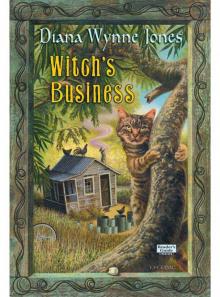 Witch's Business
Witch's Business Dogsbody
Dogsbody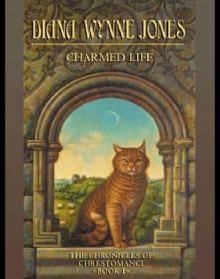 Caribbean Cruising
Caribbean Cruising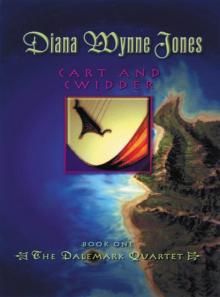 Cart and Cwidder
Cart and Cwidder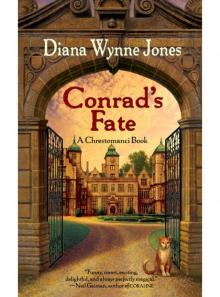 Conrad's Fate
Conrad's Fate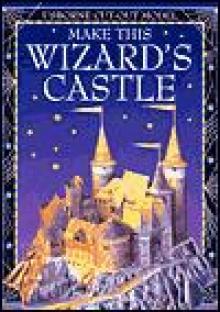 Howl's Moving Castle
Howl's Moving Castle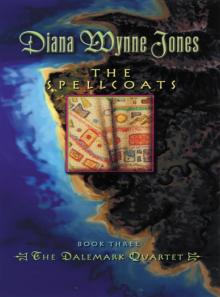 The Spellcoats
The Spellcoats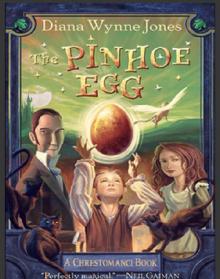 The Pinhoe Egg
The Pinhoe Egg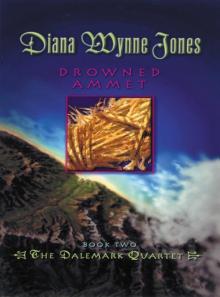 Drowned Ammet
Drowned Ammet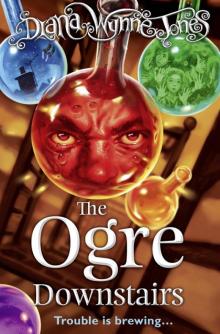 The Ogre Downstairs
The Ogre Downstairs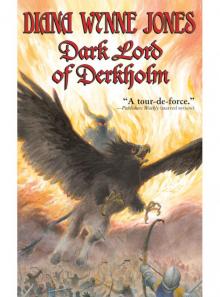 Dark Lord of Derkholm
Dark Lord of Derkholm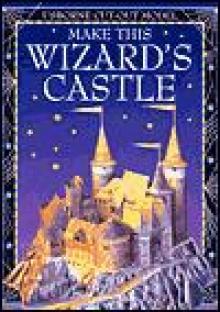 Castle in the Air
Castle in the Air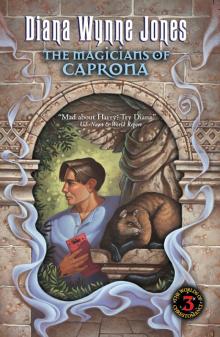 The Magicians of Caprona
The Magicians of Caprona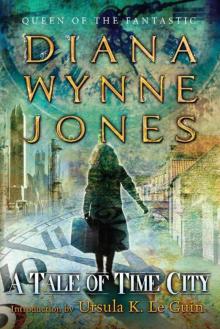 A Tale of Time City
A Tale of Time City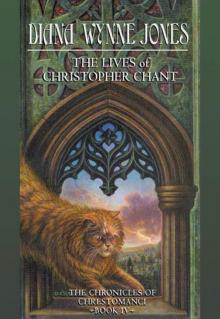 The Lives of Christopher Chant
The Lives of Christopher Chant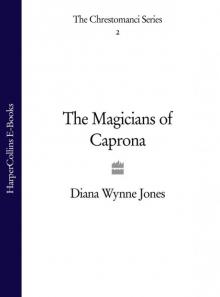 The Magicians of Caprona (UK)
The Magicians of Caprona (UK)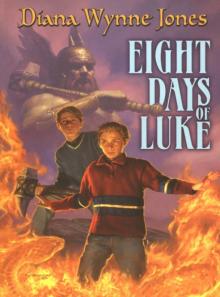 Eight Days of Luke
Eight Days of Luke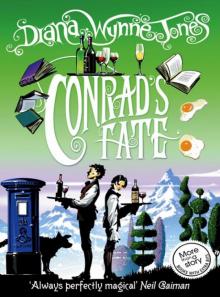 Conrad's Fate (UK)
Conrad's Fate (UK)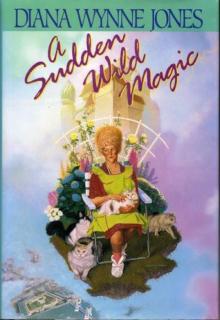 A Sudden Wild Magic
A Sudden Wild Magic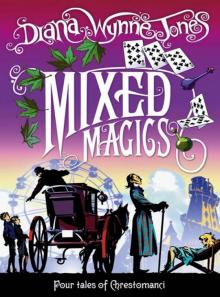 Mixed Magics (UK)
Mixed Magics (UK)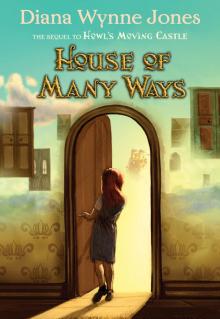 House of Many Ways
House of Many Ways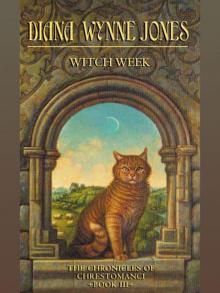 Witch Week (UK)
Witch Week (UK)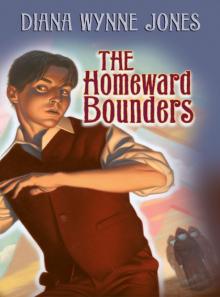 The Homeward Bounders
The Homeward Bounders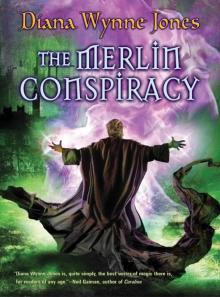 The Merlin Conspiracy
The Merlin Conspiracy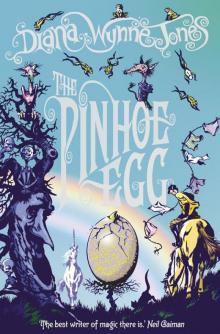 The Pinhoe Egg (UK)
The Pinhoe Egg (UK)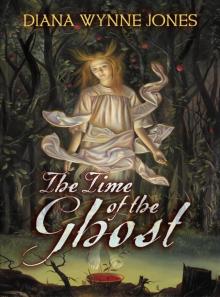 The Time of the Ghost
The Time of the Ghost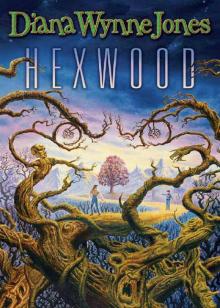 Hexwood
Hexwood Enchanted Glass
Enchanted Glass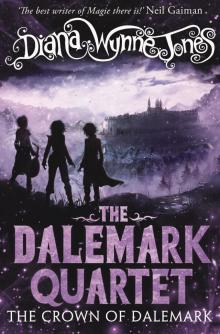 The Crown of Dalemark (UK)
The Crown of Dalemark (UK)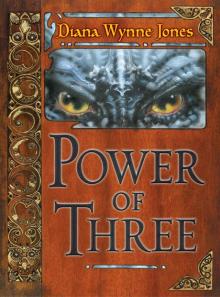 Power of Three
Power of Three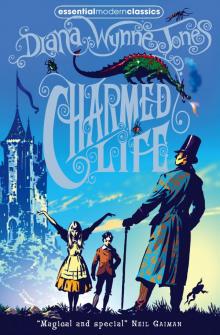 Charmed Life (UK)
Charmed Life (UK)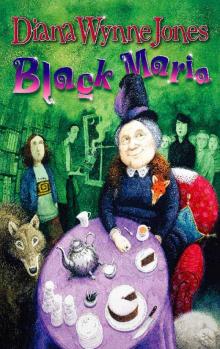 Black Maria
Black Maria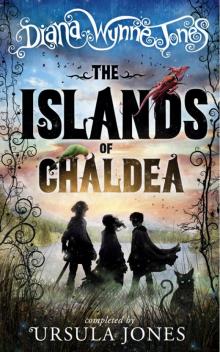 The Islands of Chaldea
The Islands of Chaldea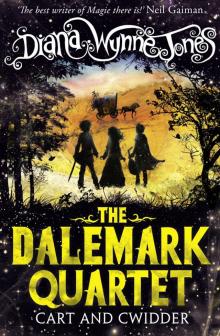 Cart and Cwidder (UK)
Cart and Cwidder (UK)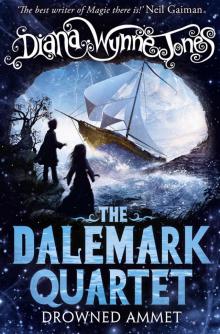 Drowned Ammet (UK)
Drowned Ammet (UK)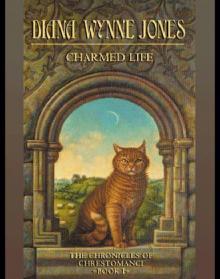 Charmed Life
Charmed Life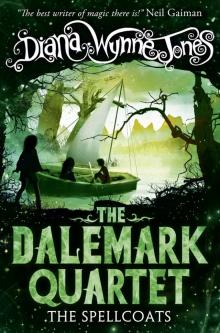 The Spellcoats (UK)
The Spellcoats (UK)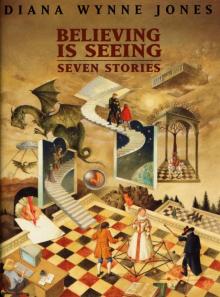 Believing Is Seeing
Believing Is Seeing Samantha's Diary
Samantha's Diary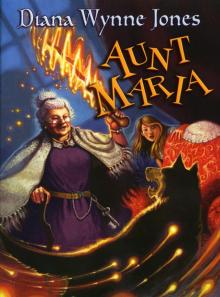 Aunt Maria
Aunt Maria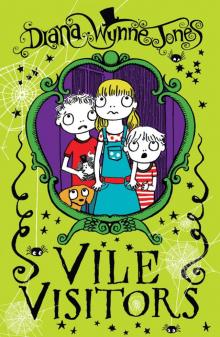 Vile Visitors
Vile Visitors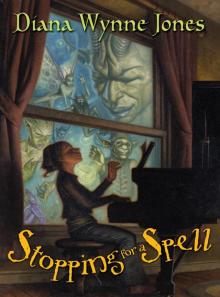 Stopping for a Spell
Stopping for a Spell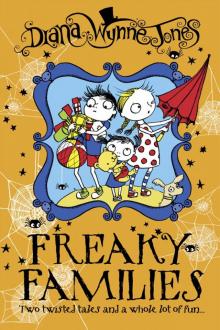 Freaky Families
Freaky Families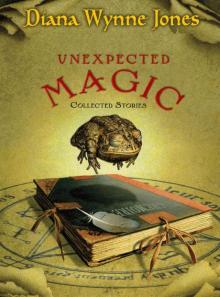 Unexpected Magic
Unexpected Magic Reflections
Reflections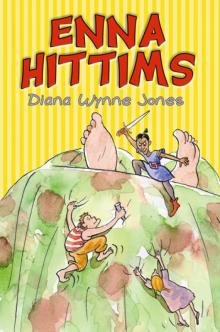 Enna Hittms
Enna Hittms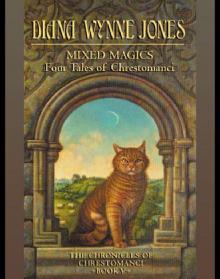 Mixed Magics: Four Tales of Chrestomanci
Mixed Magics: Four Tales of Chrestomanci